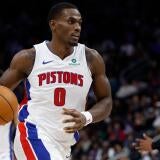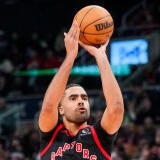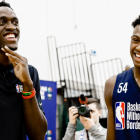Globetrotting: Beyond the bubble, the NBA is still crossing borders
While the playoffs are confined to Orlando, the game is only getting more global

Pascal Siakam and the Toronto Raptors will fight to stay alive on Wednesday in Game 6 of their second-round series against the Boston Celtics, to extend a season in which Siakam took yet another step forward. After bringing home a championship ring and a Most Improved Player trophy, he became the No. 1 option on a team that went 53-19 -- heady stuff for a 26-year-old who, eight years ago, was scampering around at a Basketball Without Borders camp in Johannesburg, South Africa.
Seven months ago in Chicago, Siakam made his first All-Star appearance, and he did so as a starter. His first stop, though, was Quest Multisport, a training facility where more than 60 prospects from around the world convened for the sixth annual Basketball Without Borders Global camp.
Siakam, a native of Douala, Cameroon, was a walking advertisement for the program. This is not just because, like all the guest coaches, he was wearing a black BWB polo. His incredible story cannot be told without that camp in Johannesburg, the stage that put him in front of scouts and served as a springboard to a prep school in Texas, where he earned a scholarship to New Mexico State.
In the gym, Siakam's smiling face was in the center of a giant poster, next to headshots of 31 other BWB alumni on NBA rosters, including his countryman Joel Embiid and teammate Marc Gasol. Another teammate, Serge Ibaka, coached at that 2012 camp, where he posed for a photo with an 18-year-old Siakam. Across the court from the poster, Siakam chatted with Olivier Maxence-Prosper, a 17-year-old forward from Montreal.
Maxence-Prosper watched Toronto win its first championship at home with his family. "I'm a Raptors fan, and I'm always going to be a Raptors fan," he said. Siakam's path from a sweltering seminary to stardom inspires him.
"The funny thing is that a lot of people, a lot of friends of mine compared me to him in terms of our style of games and everything," Maxence-Prosper said.
In a back room at Quest Multisport, Siakam signed basketballs and looked at a photo of himself from eight years ago, a skinny project with almost no experience playing organized basketball, in a BWB Africa jersey.
"Oh, man," he said. "What the hell? That's crazy. Where'd you get that picture? Let me see."
Siakam described his 2012 experience as eye-opening. It is weird, he said, to return to a BWB camp "as an All-Star and, like, somebody that people are a fan of." He remembers players like Ibaka talking to him, making him "feel like the being in the NBA was nothing, really," like such a lofty goal was attainable.
"I think it's important," he said. "It's important for these guys to see you. It's important for these people to see your face. And, for a lot of people, it's going to mean a lot. And they're going to remember this moment for the rest of their lives, something that I did."
Siakam stopped signing autographs when Kai Sotto, a 17-year-old center, approached. "What's up, baby?" Siakam said. "You good, dog?" Siakam asked Sotto where he's from (the Philippines), when he got to Chicago (the previous day), how tall he is (7-foot-2).
"Damn!" Siakam said. He suggested Sotto's shoes were as big as the size-22s on the floor next to them. Those belonged to 7-5 Senegalese Celtics center Tacko Fall, another guest coach, seated nearby. That morning, campers did a drill you won't see anywhere else: With Fall standing outside the charge circle, hands high in the air, they had to drive baseline and finish around him.
Fall said it was the most he'd ever been dunked on. Sotto tried repeatedly, but this was not an option for everyone, including 5-foot 6 Spanish guard Mama Dembele, one of the 24 girls at the camp.
"The coach was like, 'Don't be afraid,'" she said. "And I was like, 'Did you see him? He's really big!'"
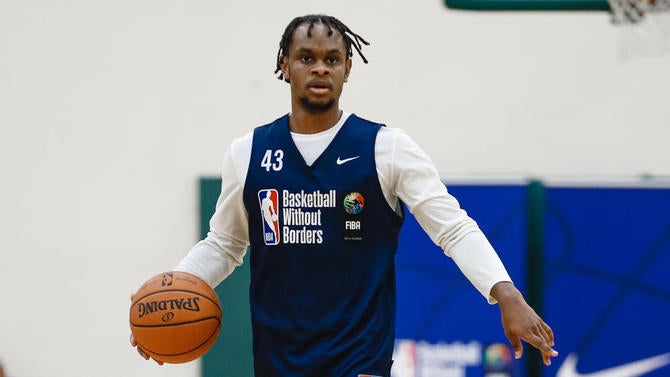
Kim Bohuny, the NBA's senior vice president of international basketball operations, described Basketball Without Borders as a platform for young prospects to be recognized as the best on their continent. This fall, Bohuny will celebrate 30 years with the league. Her first project, in 1990, was the World Clinics Program, in which Hubie Brown and Jack Ramsay trotted the globe to teach an audience of fellow coaches.
"We started with just a handful of people," she said. "At first, we focused on coaching development and player development camps around the world, working to establish better relationships with FIBA and the federations and leagues around the world. And then everything began to grow."
BWB started in 2001 with a camp in Treviso, Italy, bringing together 50 young players from across the former Yugoslavia. In 2003 the NBA hosted the first iteration of BWB Africa in Johannesburg, though it was called the Africa 100 Camp at the time. The next year, Rio de Janeiro hosted the first BWB Americas, and the year after that Beijing hosted the first BWB Asia. There have now been 62 BWB camps, held in 39 cities and 30 countries on six continents.
George Raveling, the former director of international basketball for Nike, suggested that the league bring together the best players from each of the camps, and the idea became a reality at the 2015 All-Star weekend in New York. BWB Global has become a proving ground for up-and-coming international players -- Deni Avdija, projected to be selected in or around the top five in the upcoming draft, raised his profile by winning MVP of the 2019 camp in Charlotte.
"We have the cream of the crop in basketball in this age group together, and maybe the biggest platform outside of the Finals in basketball here with All-Star," Gersson Rosas, a camp director and the president of the Minnesota Timberwolves, said. "This is like a basketball convention. Everybody that's anybody in basketball domestically and internationally is here, and these individuals are being spotlighted."
That spotlight creates a bit of dissonance -- the global camp is at once a three-day celebration of the NBA's efforts to grow the game around the world and a cutthroat competition between not-yet professionals. "Every single eye is on you," Australian guard Tamuri Wigness said. Among the execs in attendance were Pelicans VP David Griffin, Raptors GM Bobby Webster, Memphis Grizzlies VP Tayshaun Prince and Bulls GM Marc Eversley.
"We tell 'em they're constantly being evaluated on and off the court," Chris Ebersole, the NBA's director of elite basketball operations, said. "Every player here is being evaluated, and not just who scores the most points, who gets the most rebounds, but everything from body language to how you are as a teammate, how you are as a leader."
The Bulls' Lauri Markkanen was a late addition to the inaugural BWB Global Camp, on the recommendation of Hanno Möttölä, the first Finnish player to make the NBA. "It was a little bit of a coming-out party for him, it put him on the map for a lot of people," Ebersole said. This year, he was back as a coach, and he gave Australian guard Josh Giddey some advice: Don't worry about who's watching, just play your game.
Campers heard the same thing from longtime Warriors center Adonal Foyle, now retired, at one of his life skills workshops, which also included a visualization session and a talk with Arthur Agee, one of the two Chicago high schoolers that were the subjects of "Hoop Dreams." The gregarious Foyle laughed at the inherent contradiction at play.
"It's stressful!" Foyle said. "Counterproductive, right? 'Come enjoy yourself, there are going to be people watching you, you're going to get a great opportunity! But don't worry about it!' It's life."
During his discussion with Foyle at the players' hotel, Agee encouraged them to write their goals down. He asked how many of them use a planner, and Maxence-Prosper was one of less than a handful who raised their hands.
To Foyle, Agee was an appealing guest precisely because he didn't make the NBA, and instead used his "Hoop Dreams" fame to start a sportswear line and become a motivational speaker. Foyle believes the league has a moral imperative to help these kids reach their dreams, and he has a responsibility to remind them that they need backup plans, since those dreams can be derailed.
"My job is to always encroach on the smooth sailing of the ship towards great success," Foyle said, laughing. "I'm there as I reminder to say, 'Yeaaaah, I agree, I'm 100 percent on board, but just in case!' There's stories out there that we can learn from, that we should learn from."

Vin Baker played in four All-Star Games, made two All-NBA teams and won an Olympic gold medal. As a coach at BWB Global, though, his players were more interested in his current job: Giannis Antetokounmpo's assistant coach.
Baker fielded questions about Antetokounmpo's habits and quickly realized that any mention of his name would immediately get their attention. This was particularly true for one camper: 6-foot-11 German big man Ariel Hukporti.
"I want to play like the MVP for sure: Giannis Antetokounmpo," Hukporti said. "He's my favorite player. I like him a lot because we've got the same body, we've got the same size, he's athletic as f---. He's got ballhandling, he can play defense, he's a rim protector, rebounder, he can score. He won the MVP without shooting 3-pointers. That's crazy. That's, like, amazing. That's what I like. And off-court, he's like [such a] good guy. Some people run away when somebody asks for a photo or something like that, but he [doesn't]."
Hukporti said Baker encouraged him to bring the ball up like Giannis does, and David Gale, who coached Hukporti with Riesen Ludwigsburg, interjected to say that he tells him the same thing. "I don't trust my ballhandling," Hukporti said, but that wasn't much of an issue in Chicago, where he pushed everybody around in the post and was named camp MVP.
"It was awesome for me to watch," Baker said. "All my kiddos in Milwaukee joke about the post game from the '90s, and I come here for a couple days and see a 17-year-old dominating in the paint."
After a three-game winning streak, Baker cautioned his team against overconfidence. He started to tell them a story: In Milwaukee last season, his team had the best record in the league and a 2-0 series lead. Before he could finish, he noticed a smirk on the face of Josh Primo, a camper from Mississauga, Ontario.
"What are you smiling about?" Baker said.
Primo is among the players with whom Hukporti planned to stay in touch. The weekend was blur of activities, including outings to a table tennis club, All-Star Saturday and the All-Star Game itself. Parting ways is "difficult because you make new friends and you want to be with them," Dembele said, "but you know that you [must] leave, it's impossible." She hopefully suggested that some of those new friends might be future teammates, or perhaps opponents in a championship game.
For 15 of the campers, the end of the camp meant a return to an NBA Academy, where they train like professionals and study with fellow prospects. Maxence-Prosper headed to Mexico City, where his days at the Latin America academy are "very demanding," he said.
"We got school at 7:30 till 10 o'clock," Maxence-Prosper said. "Then after that we got training, shooting and lifting from about 10 to 12:30. After that, 12:30 to 3, we got off -- eat and everything. At 3 o'clock, we start school again from 3 to 6:30. And at 7 o'clock we got practice, like real practice, for about an hour and a half."
Wigness went back to the NBA Global Academy, which is housed at the Australian Institute of Sport in Canberra. Giddey did, too, but only after joining the Australian senior national team in Brisbane for an Asia Cup qualifier. The academies are part of a broader plan to keep players from getting "lost in the system," as Bohuny put it.
The league is in the business of discovering and developing talent worldwide. International Jr. NBA programs support grassroots basketball, and there are a network of NBA basketball schools around the globe. Staff -- some based in New York, some in regional offices -- go on scouting trips.
"It's definitely a lot of frequent flier miles," Ebersole said.
The pandemic, naturally, stopped all of that.
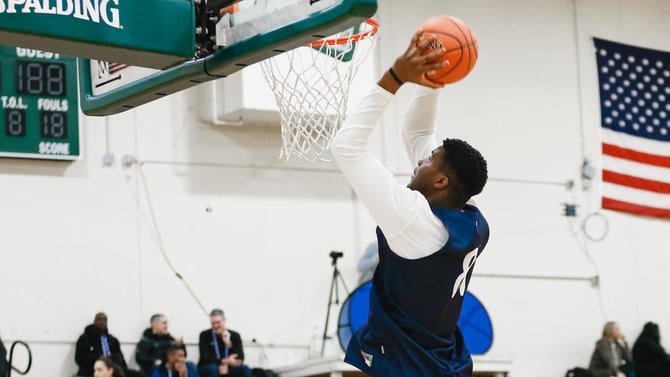
Maxence-Prosper woke up on March 13 expecting to have a normal Friday, and then his coach, Walter Roese, came to his room and told him he had to leave Mexico. Maxence-Prosper called his parents, packed his bags and left for Montreal that night on a red-eye.
"It was definitely shocking," he said. "But, you know, I understood that that's what's needed to be done."
A week earlier, he was in Atlanta, competing in a tournament with his NBA Academy Latin America teammates. Back in Montreal, he couldn't get in a gym.
"I didn't play pickup or any type of organized basketball for three and a half months," Maxence-Prosper said.
Maxence-Prosper went from a regimented routine to having all sorts of time on his hands. He continued the virtual classes he was taking in Mexico City -- the academies use a platform called Apex Learning -- and logged on to team Zoom meetings, in which coaches showed players drills and exercises they could do at home.
"It was weird, but the Zoom calls helped," Wigness said. "They'd be like, 'What are you doing? What's the schedule?' We even did like a yoga class and mindfulness and that type of stuff."
At home in Cairns, Wigness had time to reflect on his time at the academy. In January, shortly after a trip to Las Vegas for the Tarkanian Classic, he went to Barcelona, where the team beat FC Barcelona's junior squad in the championship game of the L'Hospitalet tournament. He said he fell in love with basketball because it is international, and it let him see the world.
Before enrolling at the academy, he was struggling, sidetracked and "hanging around the wrong people," Wigness said. Now he counts San Antonio Spurs guard Patty Mills as a mentor, raves about his coaches and believes his time in Canberra has "changed me" and helped him mature.
"As soon as I came in, I knew how serious it was," he said. "It was like you either switch on now or things are not going to look good."
In July, Maxence-Prosper put on a graduation gown and cap for a virtual ceremony. "It was definitely not like how I envisioned it to be," he said, but he appreciated that he and the other seniors at the Latin America academy got a send-off. The academy prepared videos for each of them, and staff talked about how they'd grown.
"That was just an hour on a Friday with all of the athletes, all of their families, the coaching staff, many of our support staff as well," Ebersole said. "And it was just really a moving, emotional at times hour."
In grad garb, Maxence-Prosper threw down a dunk on his hoop in the driveway. Now he is at Clemson, preparing for his freshman season, while Wigness and Giddey are in the NBL, having signed with the Brisbane Bullets and Adelaide 36ers, respectively. Dembele has started her college career at the University of Missouri, Hukporti has signed with Kedainiai Nevezis of the Lithuanian Basketball League and Sotto has joined the G League Ignite, the new, league-run developmental team.
Sotto is in Walnut Creek, California, training with top prospects and coach Brian Shaw. Life skills and mentoring are built into the program. It is hard to imagine such a team existing without the NBA first opening academies internationally, and it is hard to imagine those academies without BWB.
"The first step in elite development was Basketball Without Borders," Bohuny said.
Amadou Gallo Fall, the president of the Basketball Africa League and the NBA's first employee to work out of its Johannesburg office, remembers Siakam "just running up and down the court and pursuing every ball" at that life-changing camp eight years ago. Fall didn't know he was watching a future All-Star, but, "in the right environment, with proper coaching and nurturing, anything is possible," he said.




